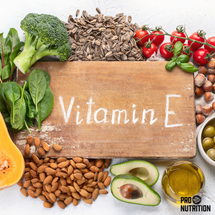Posted by Isaac Wirtz on 12th Sep 2022
Vitamin E: A Complete Overview
Vitamin E is a fat-soluble vitamin that is important to vision, reproduction, and the wellbeing of your blood, brain and skin. The body uses vitamin E to build its immune system to fight off viruses and bacteria. It helps prevent blood from clotting inside veins and also helps widen them. Cells use vitamin E to communicate with other cells and carry out many functions. Vitamin E also plays a role as an antioxidant. Antioxidants help protect the body from the damaging effects of free radicals, which are produced when we digest certain food or are exposed to smoke and radiation. Free Radicals have been linked to heart disease, cancer, and other diseases.
The amount of vitamin E you need daily will depend on your age. The daily recommendation for adults is 15mg. Vitamin E is naturally found in many foods, it is also used to fortify some foods. You can get the recommended daily amount of vitamin E by eating foods like vegetable oils, nuts, and green vegetables. You can also get vitamin E through supplementation. There are two main types of supplemental Vitamin E. The natural form is often listed as ”d-alpha-tocopherol” and the synthetic form listed as ”dl-alpha-tocopherol.” The natural form is the more potent of the two. One difficult thing about Vitamin E supplements is that many are still listed by IU instead of mg, which can make things more complicated. To simplify things; 1IU of natural Vitamin E is equal to .67mg of Vitamin E and 1IU of synthetic Vitamin E is equal to .45mg of Vitamin E.
The typical American diet provides less than the recommended amount of daily Vitamin E intake. Luckily Vitamin E deficiency is rare among healthy people and rarely do people show signs that they are not getting enough Vitamin E. Deficiencies of Vitamin E are almost always linked to certain diseases where fat is not properly broken down and absorbed. Vitamin E needs some dietary fat for the body to absorb it. Some examples of these diseases include Crohn’s, cystic fibrosis, and certain rare genetic disorders. Vitamin E deficiency can lead to nerve and muscle damage which can cause the loss of feeling in arms and legs, loss of body control, muscle and vision problems, along with a weakened immune system.
Scientists and researchers are continuing to study Vitamin E to learn all the ways it affects our health. Vitamin E is often celebrated for its role in preventing heart disease, unfortunately studies have not yet backed this claim up. Among people who suffer from (AMD) a vision related disease and cataracts, two of the most common causes for loss of vision in older people, taking a large dose of Vitamin E along with other antioxidants does show promise for slowing down the loss of vision. You do need to be cautious with high doses of Vitamin E as it can increase your risk of bleeding (due to reducing the blood’s ability to clot). For this reason the upper limit of Vitamin E for adults is 1,000mg/day.
People should always try to get all of their needed macro and micro-nutrients through whole food sources when possible. A good balanced diet with nuts and varied greens will help you obtain all the Vitamin E your body needs. In some cases fortified foods, or supplements can help prevent deficiencies and maintain optimal body function.

